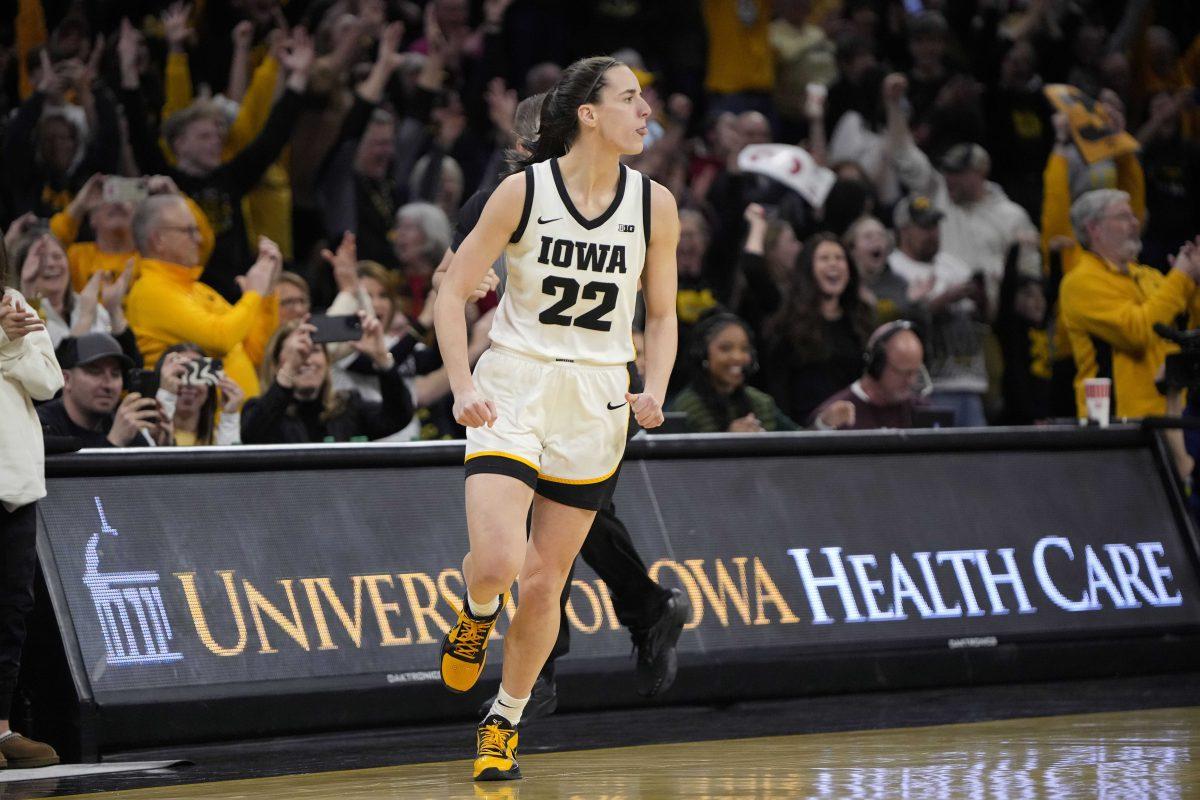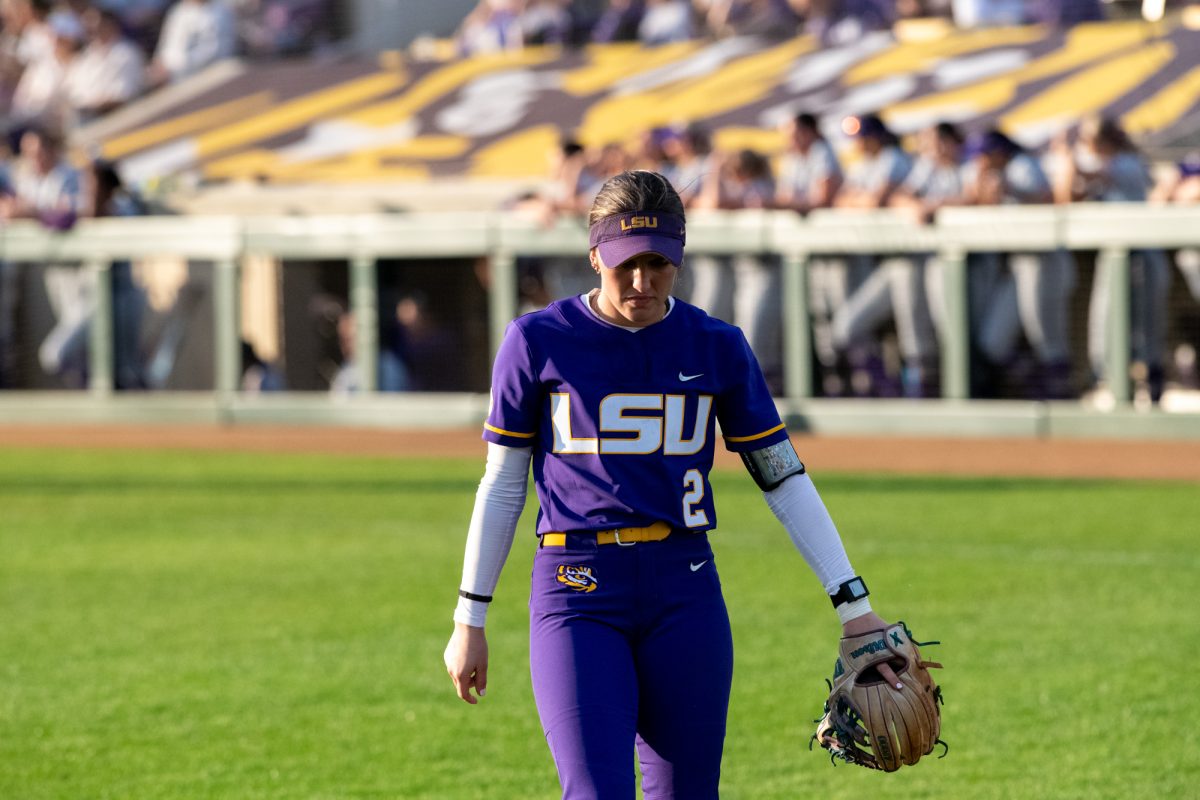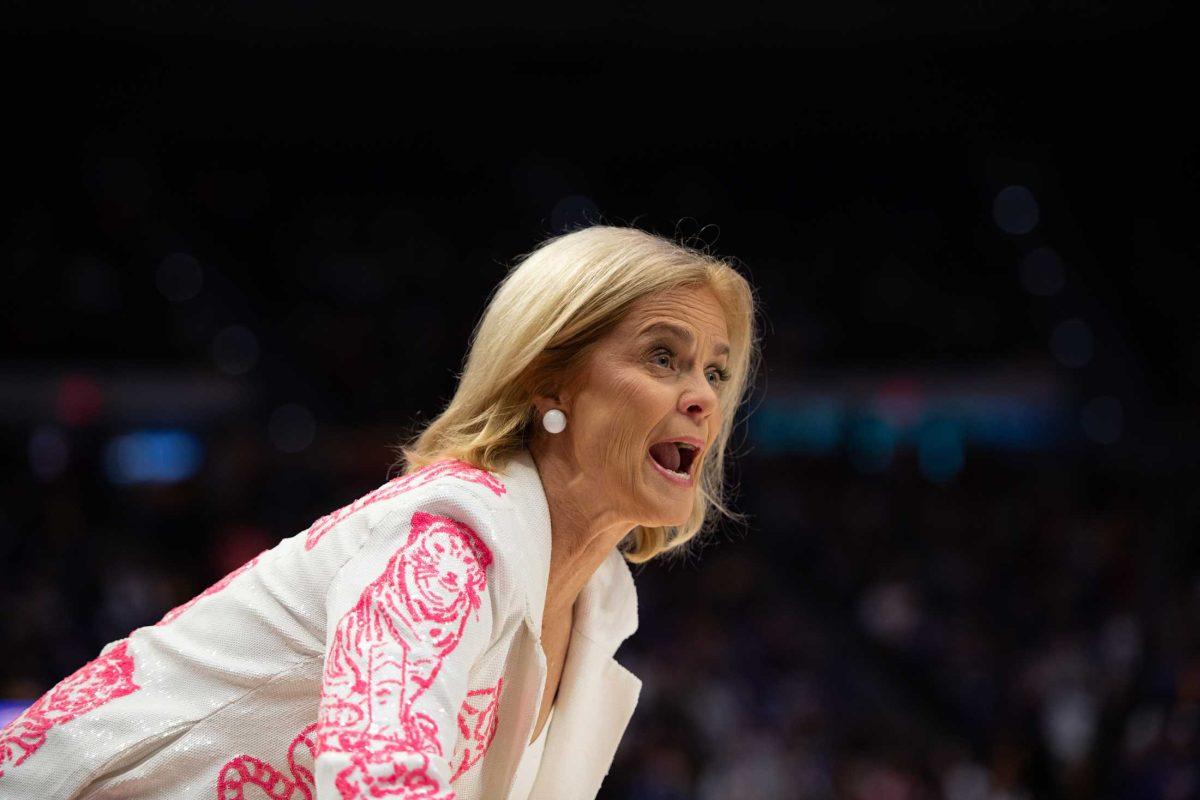Ticket prices reached hundreds of dollars, fans crossed state lines and millions watched in anticipation of a second-quarter free throw. Caitlin Clark had broken the NCAA scoring record in Iowa City.
The University of Iowa phenom has drowned in records and awards during her four years of basketball, but this one stands above the rest. Her 3,668th point broke LSU star Pete Maravich’s 54-year standing record. Significant in its own right, this achievement is and will forever stand in sports history as illustrative of both the growth and success of women’s sports in recent years.
Clark had received comparisons to Maravich prior to the record for her frame, passing ability and flashy play. Some even calling her “Ponytail Pete.”
“Just to be in the same realm of all these players that have been so successful,” Clark said about the stars she’s passed in scoring. “All these people have given so much to the game. Hopefully somebody comes after me and breaks my record, and I can be there supporting them.”
Non general admission tickets for the game reached $491 a piece, making it the most expensive women’s basketball ticket on record. Currently, the get-in cost for women’s Final Four tickets are $774, men’s Final Four are at $242, according to Forbes.
As women’s sports have continued to grow, Clark has been one of the faces, if not the face of that revolution. The spectacle of her talent has magnetized the interests of hordes of sports fans and made the demand for women’s sports undeniable.
Six different networks’ most-watched women’s basketball games have featured Clark.
“What’s been so much fun is watching all the kids sending in clips of them shooting in the driveway,” Iowa Deputy Director of Athletics Matt Henderson said. “Trying to shoot shots that are farther away than they should be, but they’re fun.”
When Clark broke the NCAA scoring record, fans traveled an average of 300 miles to witness her, according to Vivid Seats.
In its 2019-2020 season, Iowa women’s basketball averaged 7,102 in attendance. In the 2023-2024 season that average reached 14,998.
This season, Iowa sold out nearly every road game it has had, including program attendance records, like against Wisconsin. Even when she’s against home crowds, Clark still captivates.
LSU has also seen an eruption in crowd counts, powered by the hiring of legendary coach Kim Mulkey. Average attendance in its 2019-2020 season was 2,036. This season that number reached 11,491. That’s nearly a sixfold increase.
LSU set a Pete Maravich Assembly Center home attendance record for senior night in 2023 when it played Mississippi State. The game drew a total of 15,721 fans.
Much like Iowa, LSU has sold out or set record crowd numbers in all its road games this season.
Among its sellouts, was a game against Coppin State, in Baltimore, Maryland, home of LSU star Angel Reese. It’s the first time a reigning champ has played on the road against an HBCU. Coppin State sold out that night, filling its 4,100-seat capacity.
Maryland Gov. Wes Moore and Baltimore Mayor Brandon Scott were both in attendance.
When LSU comes to town, people show up. In road Southeastern Conference games this season, LSU has drawn 4,323 more fans than the opposing team’s season attendance average.
“Times are different now. What we are witnessing with these fans not just in the PMAC, but on the road, I’ve never seen anything like it,” Mulkey said. “And this isn’t my first rodeo. I won three championships at Baylor. I’ve had a 40-0 team. I’ve never seen anything like this.”
Last season’s championship, between Iowa and LSU, was the most watched game in women’s college basketball history, at 9.9 million viewers. That more than doubled 2022 numbers. It also beat average viewership for the 2023 World Series.
Interest does not sit alone at the top. This season, the Big Ten tournament sold out for the first time ever. In fact, women’s college basketball is now averaging a larger audience than men’s basketball on FOX, 981,000 to 946,000. Women’s basketball is up 48% on FOX and 60% on all networks.
Despite all this, the success has very much been in spite of the lacking support from media, production and administration.
In 2021, an obtuse disparity in weight room quality provided by the NCAA between the men’s and women’s teams visualized the indifference of the NCAA to growing the women’s game.
The NCAA spending gap between the men’s and women’s tournaments was $35 million just a couple seasons ago. The NCAA actually refused allowing women to use the March Madness brand until 2022.
But once the market for it was finally realized and embraced, it took off.
“Women’s basketball has always had stars, they’ve always had strong personalities,” said Reed Darcey, LSU women’s basketball beat reporter for The Advocate. “But they haven’t really had the people willing to put in the work to market them and put them out there, to focus on them and give them the equal treatment that they deserve.”
That embrace can be seen in the projects that have been or are currently being developed around it. “Shattered Glass,” a WNBA documentary came out in January. “Full Court Press” a docuseries that focuses on UCLA’s Kiki Rice, South Carolina’s Kamilla Cardoso and Iowa’s Caitlin Clark comes out in May. “The Money Game” a name, image, likeness docuseries that features Angel Reese, Olivia Dunne and Flau’jae Johnson is currently in development.
While support from administration, production and media are needed for success, make no mistake, the ascendance of women’s sports has come from the individuals.
“We’ve really benefitted from Coach Dawn Staley pushing the envelope from the time she got here,” South Carolina Assistant Athletic Director Diana Koval said. “Pushing administration and everybody to buy in and invest in it.”
The selfless nature of the women who headline the sport has been crucial to its prosperity.
“We want million-dollar salaries,” said Minnesota Lynx player Napheesa Collier on the Athletic Women’s Basketball Show. “I don’t think I’ll have that, but I’m pushing for the people after me to have that because we want a better future for the people who come after us.”
Athletes and coaches understand that their involvement and their impact affect so much more than themselves. What they do can revolutionize sports, as we have seen.
“Staley is saying what do we need to do to grow the game,” Koval said. “She shines a spotlight on other coaches, other players, other programs whenever she can to say they’re doing a great job there as well.”
Selfless interests, sheer talent and a waiting market have launched growth; Name, Image and Likeness deals have accelerated it.
“They’re finally allowed now to tell their own stories, market themselves and capitalize on their name, image and likeness,” Darcey said. “I think that’s one of the biggest reasons why the sport has taken off so much. Players are so magnetic; people really love them.”
Clark and Reese currently rank fourth and eighth, respectively, in NIL valuations.
“Anywhere Caitlyn Clark goes and anywhere Angel Reese goes, those two are ecosystems or economies of themselves within the collegiate landscape,” Zena Keita said on the Athletic Women’s Basketball Show. “I can see them doing a similar thing on the pro level.”
It’s not just women’s basketball. At LSU alone, gymnastics has been incredibly successful too.
Last year, “The Climb”, which followed the gymnastics team, was the most popular piece of content for LSU Gold, said Cody Worsham, associate athletic director and chief brand officer at LSU.
“I have a few student athletes, one of them the other day said to me how good it made her feel that we invest in women’s sports,” Worsham said. “That we care about women’s sports, that we cover the female student athletes and provide content that’s as high quality as we do for the male student athletes.”
LSU finished No. 1 in the country in social media engagements for gymnastics, women’s basketball and track and field, Worsham said.
From Baton Rouge to Tokyo, and gymnastics to hockey, viewership across the globe is reaching historic numbers.
The 2020 Olympics featured a record number of women participating, while consumers across the United States and Canada tuned in to watch women compete in prime time at higher rates than ever before.
In September, Nebraska volleyball played in its football stadium, setting a women’s sports attendance record of 92,003. Women’s Super League set an attendance record in February with 60,160 fans.
In 2024 alone we’ve seen the start of the Professional Women’s Hockey League and the Pro Volleyball Federation.
One thing that can be learned from the history of sports is that initial greatness breeds future greatness. Women’s sports are preforming at a level like never before. The only way is up.
“I want my legacy to be the impact I can have on young kids and the people in the state of Iowa,” Clark said through tears in a press conference after losing the NCAA championship. “I was just that young girl, so all you have to do is dream and you can be in moments like this.”












